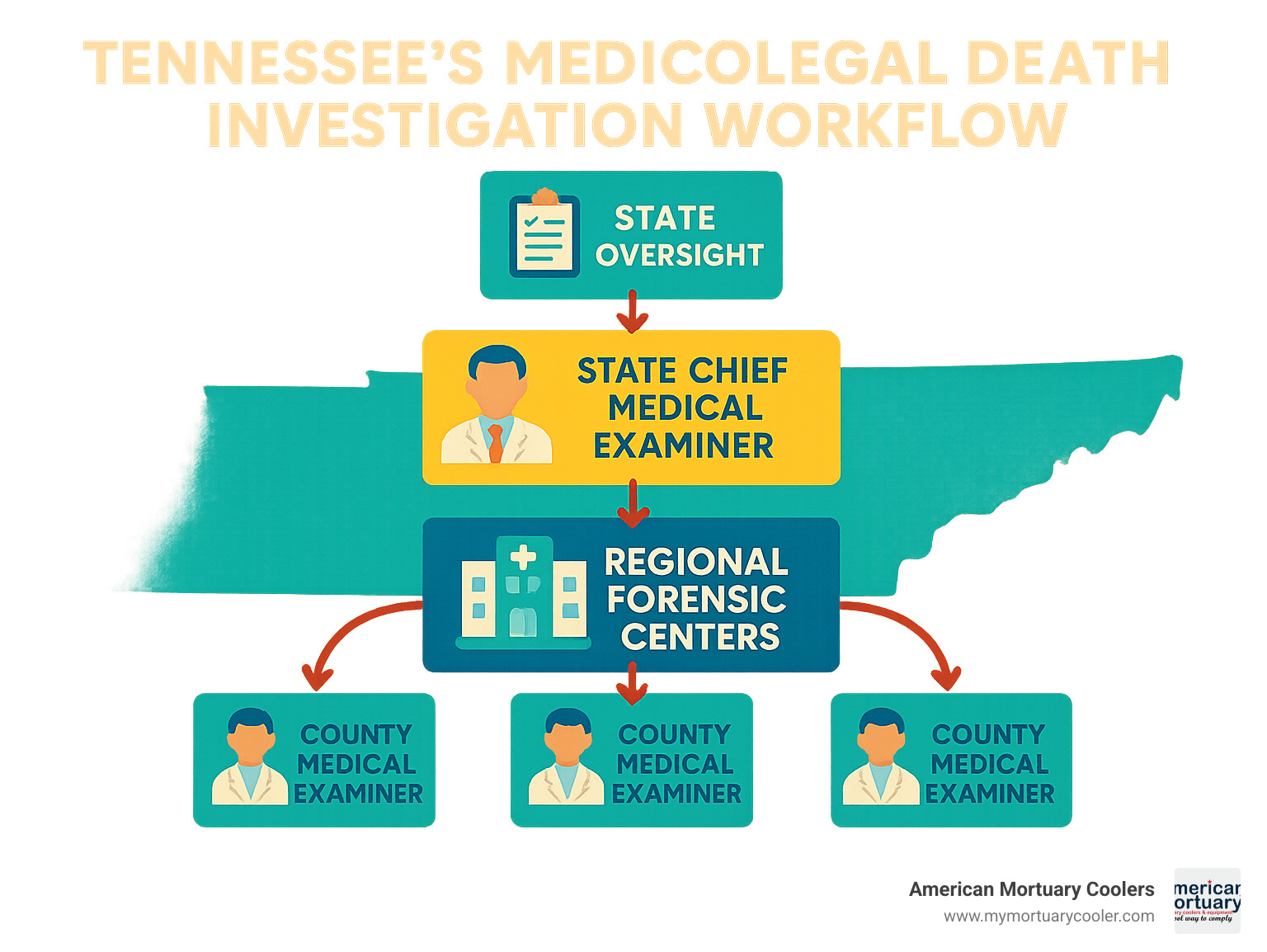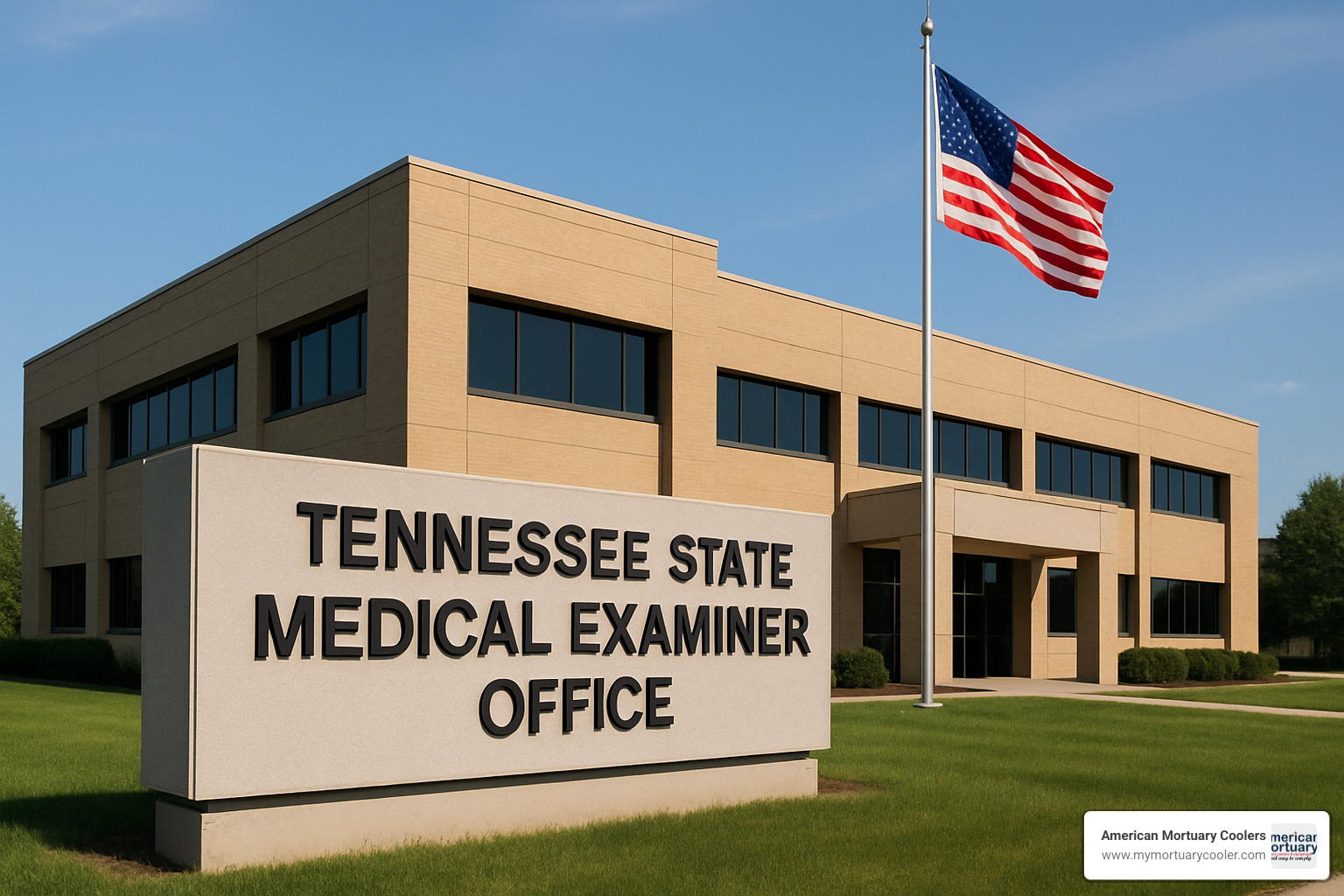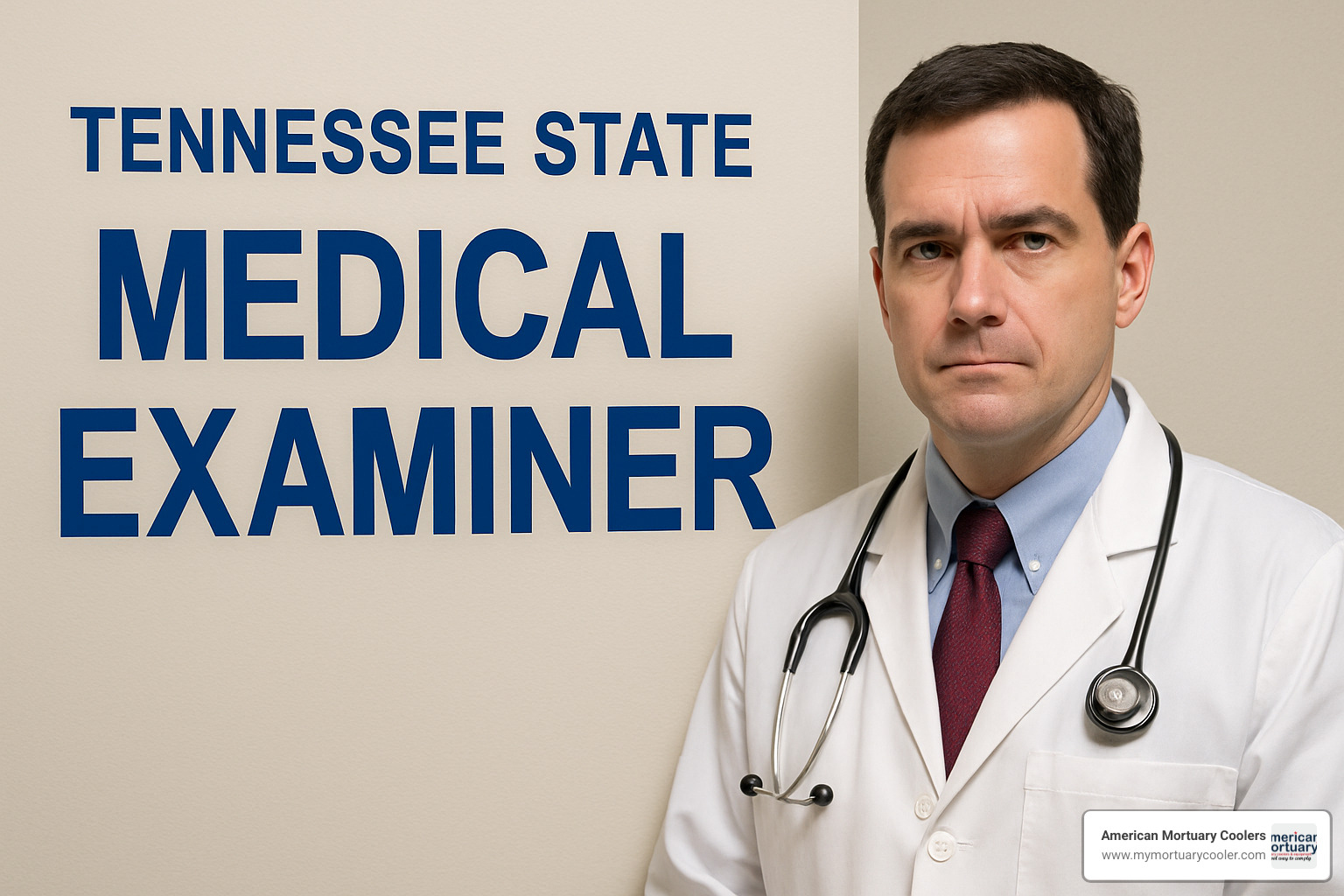Understanding Tennessee's Medicolegal Death Investigation System
For those seeking quick information about the TN state medical examiner:
| Position | Qualifications | Term | Location |
|---|---|---|---|
| Chief Medical Examiner | Board-certified pathologist with forensic pathology certification | 5-year term (unlimited renewals) | Nashville (central office) |
| Deputy Medical Examiners | Same as Chief ME | Based on appointment | One per grand division, plus Johnson City satellite |
| County Medical Examiners | Licensed physician | Appointed by county mayor | All 95 counties |
The TN state medical examiner system operates under the Tennessee Department of Health to ensure consistent, high-quality medicolegal death investigations statewide. This county-based system features a State Chief Medical Examiner who oversees the entire network, providing training, guidelines, and quality assurance for all 95 county medical examiners. The system includes five regional forensic centers accredited by the National Association of Medical Examiners (NAME), where board-certified forensic pathologists perform autopsies ordered by county medical examiners.
When a death occurs that meets reporting criteria—such as violent, sudden, suspicious, unattended, or in-custody deaths—the county medical examiner investigates and may order an autopsy at the appropriate regional center. This structured approach ensures thorough, standardized investigations while maintaining local responsiveness.
The Office of the State Chief Medical Examiner (OSCME) also maintains the Tennessee Violent Death Reporting System (TNVDRS), collecting vital data that informs public health and safety initiatives across the state.
I'm Mortuary Cooler, a national-level mortuary cooler supplier with extensive experience working with TN state medical examiner facilities to provide compliant refrigeration solutions that meet their specific forensic standards and operational requirements.

Tn state medical examiner terms at a glance:
Understanding the TN State Medical Examiner System
Tennessee's medicolegal death investigation system is like a well-choreographed dance between local authority and statewide oversight. This thoughtfully designed network ensures that whether a death occurs in the smallest rural county or the busiest city center, the same high-quality forensic examination standards apply everywhere.

The TN state medical examiner system operates under the Tennessee Department of Health, not law enforcement. This deliberate decision highlights the medical examiner's primary connection to public health and vital statistics, though they certainly work hand-in-hand with the criminal justice system when needed.
At the heart of this system sits the Office of the State Chief Medical Examiner (OSCME), providing leadership from its Nashville headquarters, with a satellite office in Johnson City to better serve the eastern parts of our beautiful state.
The system's backbone includes guidance from the Medical Examiner Advisory Council – nine appointed experts who help shape appointments, policies, and standards. This diverse council ensures the system maintains top-notch professional standards that serve all Tennesseans.
What makes Tennessee's approach stand out is our network of five Regional Forensic Centers (RFCs), all proudly accredited by the National Association of Medical Examiners (NAME). This accreditation means these facilities meet or exceed national standards for forensic pathology services. You can learn more about these centers at the Tennessee Department of Health website.
Qualifications & Appointment of the TN State Medical Examiner
Becoming the State Chief Medical Examiner requires strict qualifications. According to Tennessee law, the Chief Medical Examiner must be:
- A pathologist certified by the American Board of Pathology
- Specifically skilled in forensic pathology
- Licensed (or able to get licensed within six months) to practice medicine in Tennessee
The appointment happens after recommendation by the Medical Examiner Advisory Council and appointment by the Health Commissioner. Once in the role, the Chief serves for five years and can be reappointed for unlimited consecutive terms.
This combination of strict qualifications and potential long-term service creates stability and expertise. The six-month window for getting a Tennessee medical license means we can recruit the best talent nationwide while ensuring they'll meet all state requirements.
Duties & Responsibilities of the State Chief Medical Examiner
The TN state medical examiner does far more than perform autopsies. Their job includes developing statewide standards and protocols for death investigations throughout all 95 counties. They're also our state's primary educator, providing essential training for county medical examiners and death investigators – a role specifically required by law.
Quality assurance is another crucial responsibility. The Chief reviews reports, consults on difficult cases, and makes sure investigations are consistent across the entire state. When tragedy strikes in the form of mass fatalities, they take direct authority, coordinating the identification, examination, and respectful handling of victims.
Public health protection is always top of mind. The Chief investigates deaths that might signal threats to public health or safety, contributing valuable information to disease tracking and prevention efforts.
They also oversee the Tennessee Violent Death Reporting System (TNVDRS), which has been collecting comprehensive data since 2020. This system brings together information from death certificates, medical examiner reports, and law enforcement to help understand and prevent violent deaths.
County & Regional Network: Investigations, Autopsies, and Training
What makes Tennessee's medical examiner system truly special is its thoughtfully designed tiered approach. Think of it as a well-choreographed dance between local responsiveness, regional expertise, and state-level guidance. Every single one of Tennessee's 95 counties has their own appointed medical examiner who serves as the first responder when death comes knocking in unexpected ways.

These county medical examiners are chosen through a democratic process – they're appointed by the county mayor (with confirmation from the county legislative body) based on recommendations from local physicians. While they must be licensed doctors, they don't necessarily need to be forensic pathologists. They're your community physicians who take on this additional responsibility to serve their neighbors in difficult times.
When a case requires more specialized examination, county medical examiners don't have to go it alone. They can refer cases to one of Tennessee's five Regional Forensic Centers (RFCs):
- East Tennessee Regional Forensic Center in Knoxville
- Northeast Regional Forensic Center in Johnson City
- Southeast Tennessee Regional Forensic Center in Chattanooga
- Middle Tennessee Regional Forensic Center in Nashville
- West Tennessee Regional Forensic Center in Memphis
Each center is a hub of expertise, staffed by board-certified forensic pathologists who have dedicated their careers to speaking for those who can no longer speak for themselves. All five centers maintain accreditation from the National Association of Medical Examiners (NAME), ensuring they uphold the highest national standards.
This regional approach makes perfect sense when you consider just how rare forensic pathologists are – there are only about 500 practicing in the entire United States today! By centralizing these specialists in regional centers, Tennessee maximizes their expertise and ensures consistent, high-quality autopsy services from Mountain City to Memphis.
At American Mortuary Coolers, we've been privileged to work with several Tennessee facilities, providing custom refrigeration solutions that meet their exacting standards. More info about mortuary cooler standards
Reportable Deaths & Autopsy Workflow
The TN state medical examiner system has clear guidelines about which deaths require investigation. Tennessee Code Annotated § 38-7-108 spells out that violent deaths, sudden or unexpected deaths, deaths under suspicious circumstances, deaths in custody, unidentified persons, public health threats, deaths without medical attendance, deaths during medical procedures, and cases where cremation is requested must all be reported.
When such a death occurs, the process unfolds with careful attention to detail. The county medical examiner begins with an initial investigation – sometimes visiting the scene, examining the body externally, reviewing medical records, and speaking with witnesses or family members. Based on what they find, they decide whether a full autopsy is necessary.
If an autopsy is ordered, the journey continues to the appropriate Regional Forensic Center. There, a forensic pathologist conducts a thorough examination that typically includes looking at the body inside and out, collecting samples for toxicology testing, taking photographs and creating diagrams, and gathering evidence when needed.
The resulting autopsy report is a comprehensive document that tells the story of what happened. Most reports are completed within 75 days, though complex cases might take 90 days or longer, especially when specialized testing is needed. Once finished, these reports become public records in Tennessee, accessible through a streamlined online request process. Scientific research on autopsy report access
Training & Continuing Education Requirements
The folks behind the TN state medical examiner system understand that knowledge is power. That's why they've created a robust training program that keeps everyone sharp and up-to-date on the latest techniques and best practices.
When a new county medical examiner is appointed, they receive initial training from the Office of the State Chief Medical Examiner. This foundation gives them the essential skills for investigating deaths, assessing scenes, examining bodies, and documenting their findings.
But the learning doesn't stop there. Continuing education is a must, and the OSCME makes it accessible through various training opportunities throughout the year. One particularly popular program is the "Bridging the Gap: Where There's Smoke..." workshop series. These two-day sessions focus on investigating fire-related and mass casualty deaths.
For those who prefer learning online, the OSCME offers a two-part death certification course that provides continuing medical education credits. Led by the State Chief Medical Examiner and Deputy, these presentations cover the nuances of determining and documenting cause and manner of death.
Many county medical examiner investigators go above and beyond by earning specialized certifications like EMT-P (Emergency Medical Technician-Paramedic) or ABMDI (American Board of Medicolegal Death Investigators) credentials. More info about morgue freezer safety
Interagency Collaboration, Public Records, and System Challenges
The TN state medical examiner system thrives on collaboration. Behind every thorough death investigation is a network of professionals working together to find answers—from law enforcement officers securing crime scenes to public health officials tracking mortality trends.

Interaction with Law Enforcement & Public Health
When someone dies unexpectedly in Tennessee, a carefully choreographed process begins. The county medical examiner and law enforcement arrive at the scene, each with distinct but complementary roles. While officers secure the perimeter and gather witness statements, the medical examiner focuses on the body—examining it exactly where it was found before anyone moves it.
"The first few hours are critical," explains a veteran death investigator. "What we document at the scene often answers questions that can never be addressed later, even during autopsy."
This partnership follows well-established protocols. Officers and medical examiners photograph the scene from multiple angles, carefully label and document evidence, and maintain strict chain-of-custody procedures. When the body needs to be transported, detailed documentation follows it every step of the way.
Beyond individual cases, the TN state medical examiner system contributes to public health in profound ways. Since 2020, the Tennessee Violent Death Reporting System (TNVDRS) has collected comprehensive data on violent deaths across the state. By analyzing information from death certificates, medical examiner reports, and law enforcement records, public health officials can identify patterns and develop targeted prevention strategies.
When disaster strikes, this collaboration becomes even more vital. The State Chief Medical Examiner has legal authority to take charge during mass fatality events, coordinating the complex process of victim identification and examination while working alongside emergency management agencies, hospitals, and funeral homes.
Public Records Available from the TN State Medical Examiner
Transparency is more than a buzzword in Tennessee's death investigation system—it's built into its foundation. When families are seeking answers about a loved one's death, several key documents are available to them:
Autopsy reports become public records once completed. These detailed documents provide a comprehensive account of the forensic pathologist's findings, including external and internal examinations, toxicology results, and the official determination of cause and manner of death. While some sensitive information may be redacted in certain cases, most content is accessible to families and other interested parties.
Death certificates contain essential information about the deceased and their death. While medical examiners contribute to these documents in cases under their jurisdiction, families typically obtain certified copies through the Office of Vital Statistics or their funeral home.
Reports of Investigation (ROI) detail the county medical examiner's initial findings, including scene observations and preliminary conclusions. County medical examiners must submit these reports to the state office for all cases they investigate.
Tennessee has modernized its records request process in recent years, creating an online portal that makes it easier for families to request autopsy reports. This user-friendly approach reflects the system's commitment to serving grieving families with compassion and efficiency.
Challenges, Controversies & Quality Assurance
Despite its strengths, Tennessee's medical examiner system faces significant problems. The nationwide shortage of forensic pathologists hits particularly hard here. With fewer than 500 board-certified forensic pathologists practicing across the entire United States, recruiting and retaining these specialized physicians remains difficult. Heavy caseloads can lead to burnout and delays in completing reports, causing additional distress for waiting families.
Resource disparities among Tennessee's 95 counties create another challenge. While Davidson County (Nashville) maintains sophisticated facilities and multiple full-time death investigators, rural counties often rely on part-time medical examiners with limited resources. The regional forensic center approach helps balance these disparities, but gaps remain.
To maintain quality despite these challenges, the TN state medical examiner system employs several safeguards. All five Regional Forensic Centers maintain accreditation from the National Association of Medical Examiners (NAME), undergoing regular inspections and adhering to rigorous standards. Autopsy reports undergo peer review before finalization, and the Medical Examiner Advisory Council provides ongoing oversight and recommendations.
At American Mortuary Coolers, we've worked closely with Tennessee's medical examiner facilities to ensure their refrigeration systems meet these exacting standards. Proper body preservation is essential for accurate forensic examination, and our custom solutions are designed to maintain optimal conditions while accommodating each facility's unique space constraints and caseload requirements.
Frequently Asked Questions about the TN State Medical Examiner
What types of deaths fall under medical examiner jurisdiction?
When families ask about which deaths require investigation, I explain that Tennessee law casts a wide net to ensure public safety. Under Tennessee Code Annotated § 38-7-108, the TN state medical examiner system must investigate several categories of deaths.
Violent deaths like homicides, suicides, and accidents naturally fall under their jurisdiction. But many people don't realize that sudden unexpected deaths, even when they seem natural at first glance, often require medical examiner involvement too.
Deaths occurring under suspicious circumstances clearly need investigation, as do deaths of people in law enforcement custody or incarceration. Many families are surprised to learn that all bodies intended for cremation must be examined by a medical examiner first—this is an important safeguard to ensure evidence isn't permanently destroyed.
Public health concerns also trigger medical examiner involvement. For instance, if someone dies from what might be a contagious disease, the medical examiner helps determine if there's a broader threat to the community.
One aspect that often confuses families is the "delayed death" scenario. Let's say your grandmother falls, becomes bedridden, and passes away months later. Even though time has passed, this is still considered a traumatic death requiring investigation because the fall set in motion the circumstances leading to her death.
How long does an autopsy report take and how do I get it?
"When will we have answers?" This is one of the most common questions families ask during what's already a difficult time. In Tennessee, autopsy reports typically take about 75 days to complete, though I always prepare families for the possibility of a longer wait.
Complex cases often need 90 days or more, especially when specialized testing is required. Toxicology testing can be particularly time-consuming, sometimes taking weeks to complete and interpret. Cases requiring genetic studies, detailed brain examination, or consultation with subspecialists naturally take longer.
I've seen how difficult waiting can be for grieving families. The good news is that once completed, autopsy reports in Tennessee become public records that are relatively straightforward to obtain. You have several options:
The simplest method is using the online request portal through the Office of the State Chief Medical Examiner. Alternatively, you can download and complete their PDF request form. Some families prefer to contact the specific Regional Forensic Center that performed the autopsy directly.
When families receive the report, they often have questions about the medical terminology and conclusions. I always recommend reaching out to the forensic pathologist who performed the examination—their contact information should be in the report itself, and most are willing to explain their findings.
One common point of confusion: autopsy reports and death certificates are different documents with different requesting procedures. While the TN state medical examiner system provides autopsy reports, you'll need to contact the Office of Vital Statistics or your funeral director for death certificates.
How does the system handle mass fatalities or public health threats?
When disaster strikes—whether it's a tornado, a transportation accident, or a public health emergency—the TN state medical examiner system shifts into a specialized response mode.
During mass fatality events, the State Chief Medical Examiner has the legal authority to take direct control of the response. This centralized approach ensures consistent handling of all cases while making the most of limited forensic resources.
The response typically begins with deploying the State Disaster Mortuary Team and establishing temporary morgue facilities if needed. Victim identification becomes a primary focus, using a combination of scientific methods including dental records, fingerprints, and DNA analysis when necessary.
Behind the scenes, there's intensive coordination with emergency management agencies, law enforcement, and healthcare systems. For families, perhaps the most important aspect is the establishment of family assistance centers, where loved ones can receive information, support, and guidance through the identification process.
When deaths involve public health threats like infectious diseases, the approach changes. The TN state medical examiner works closely with public health officials, implementing special handling protocols and personal protective equipment requirements. Testing for pathogens becomes a priority, with rapid reporting to disease surveillance systems.
At American Mortuary Coolers, we've supported several Tennessee facilities during emergency situations, providing temporary cold storage solutions when existing capacity was overwhelmed. More info about American Mortuary Coolers solutions
Conclusion
The TN state medical examiner system shines as a thoughtfully crafted approach to death investigation across our state. It's like a well-orchestrated symphony where county medical examiners, regional forensic centers, and the state office all play vital roles in harmony. This careful balance ensures that whether a death occurs in busy Memphis or rural Polk County, the same thorough, professional standards apply.
What makes Tennessee's system special? It's the layered approach that brings together local knowledge with specialized expertise. It's the dedication to ongoing education that keeps professionals sharp and current. It's the commitment to meeting national accreditation standards that ensures quality. And it's the seamless integration with public health surveillance that helps protect the living while honoring the dead.
The Office of the State Chief Medical Examiner puts it beautifully in their mission: to create "statewide consistency of high-quality medicolegal death investigation and forensic autopsy services." This isn't just bureaucratic language – it's a promise to Tennessee families that their loved ones will be treated with dignity and respect during life's most difficult moments.
Of course, no system is perfect. The nationwide shortage of forensic pathologists affects Tennessee too. Some counties have more resources than others. But what's impressive is how the system responds – with peer reviews, accreditation checks, and a commitment to always improving.
For families going through the fog of grief, understanding this system can be incredibly helpful. Those autopsy reports and other public records aren't just paperwork – they're answers that can bring closure, help with practical matters like insurance, and sometimes even bring justice.
At American Mortuary Coolers, we feel privileged to support Tennessee's medical examiner system with refrigeration solutions that meet the unique needs of forensic facilities. Our mortuary coolers are designed with the specific temperature requirements, capacity needs, and workflow considerations that modern forensic operations demand. More info about American Mortuary Coolers solutions
The TN state medical examiner system continues to evolve through partnerships between medical professionals, law enforcement, public health officials, and supporting services like ours. Together, this network serves both the living and the deceased with scientific excellence, genuine compassion, and unwavering professionalism – values that make Tennessee's approach to death investigation truly exemplary.


















